Duo-Cytra Oral Solution 200 ml
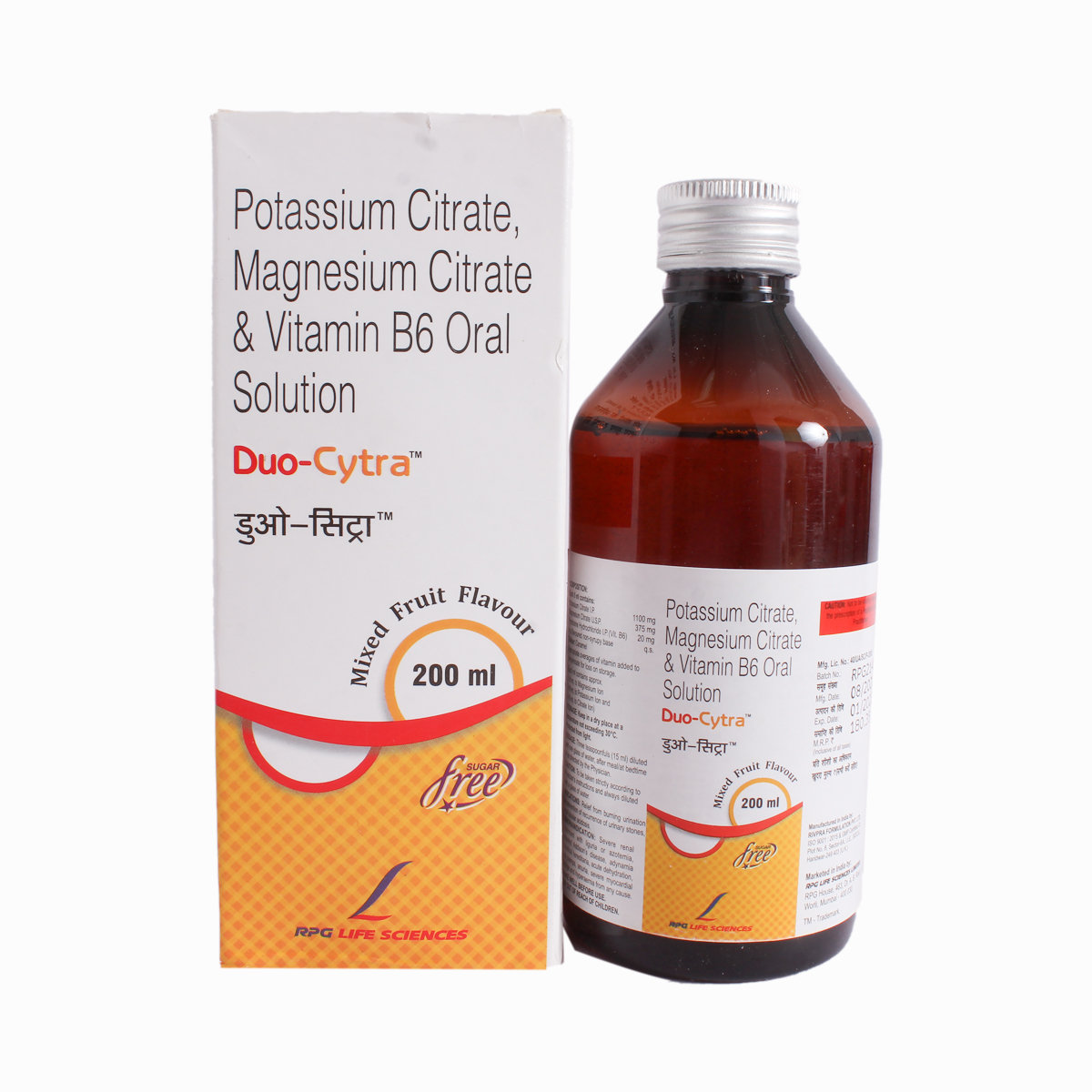
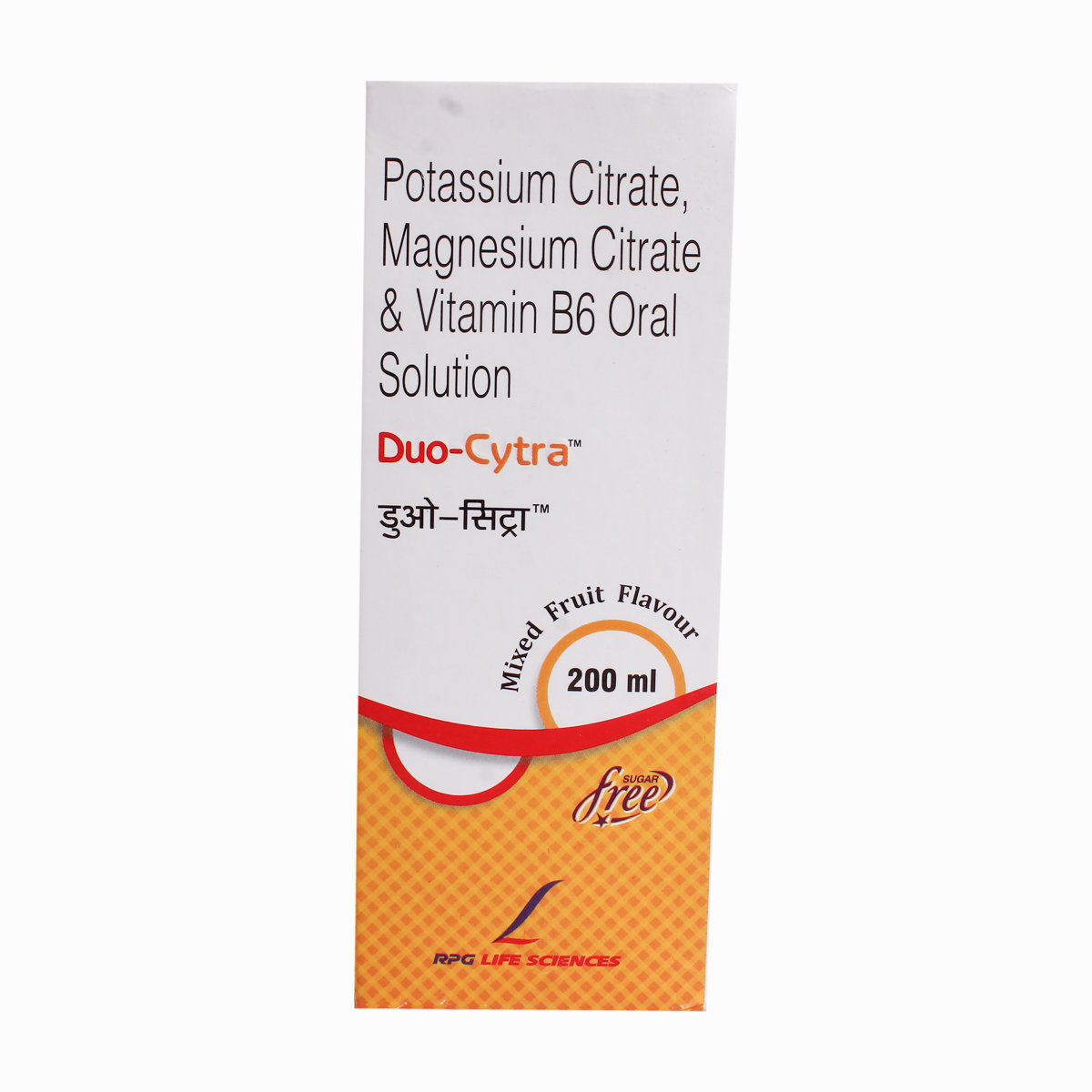
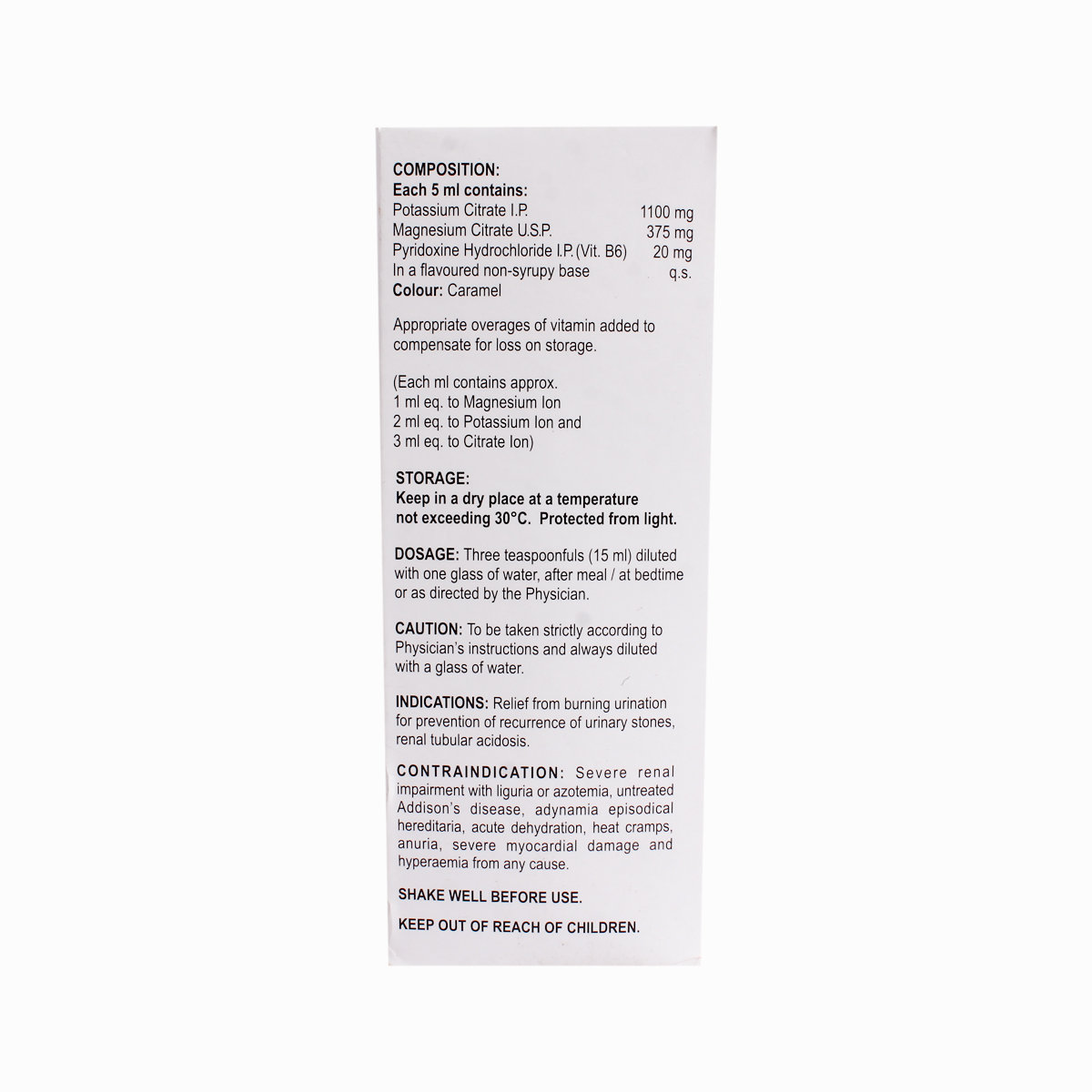



MRP ₹224.5
(Inclusive of all Taxes)
₹33.7 Cashback (15%)
Provide Delivery Location
Online payment accepted
 Prescription drug
Prescription drugWhats That
 23 people bought
23 people bought Synonym :
Manufacturer/Marketer :
Consume Type :
Return Policy :
Expires on or after :
About Duo-Cytra 200Ml Solution
Duo-Cytra 200Ml Solution is indicated for the treatment of renal tubular acidosis and kidney stones. It also helps provide relief from the burning sensation during urination. Kidney stones are small, hard deposits made up of calcium, phosphate, and other minerals/acid salts that stick together in concentrated urine. Renal tubular acidosis is a condition in which the kidneys fail to excrete acids into the urine, this causes the blood to remain too acidic.
Duo-Cytra 200Ml Solution is a combination of three drugs, namely: Magnesium citrate, Potassium citrate, and Pyridoxine hydrochloride. Duo-Cytra 200Ml Solution raises the urinary pH, potassium, magnesium, and citric acid levels; this prevents the crystallization, growth, and accumulation of stone-forming salts.
Take Duo-Cytra 200Ml Solution as prescribed. You are advised to take Duo-Cytra 200Ml Solution for as long as your doctor has recommended it for you, depending on your medical condition. In some cases, you may experience certain common side effects such as abdominal discomfort, diarrhoea, nausea, and vomiting. Most of these side effects do not require medical attention and will resolve gradually over time. However, you are advised to talk to your doctor if you experience these side effects persistently.
Consult your doctor before taking Duo-Cytra 200Ml Solution if you are pregnant or breastfeeding. Duo-Cytra 200Ml Solution is not recommended for children as safety and effectiveness have not been established. Duo-Cytra 200Ml Solution is not recommended for patients with renal insufficiency as it might increase the risk for the development of hyperkalemia (high potassium levels) and soft tissue calcification. Keep your doctor informed about your health condition and medicines to rule out any side effects.
Uses of Duo-Cytra 200Ml Solution
Directions for Use
Medicinal Benefits
Duo-Cytra 200Ml Solution is a combination of three drugs, namely: Magnesium citrate, Potassium citrate, and Pyridoxine hydrochloride. Duo-Cytra 200Ml Solution is indicated for the treatment of renal tubular acidosis, kidney stones, prevents recurrence of calcium oxalate nephrolithiasis (calcium oxalate stones) and uric acid lithiasis (uric acid stones) with or without calcium stones. It also helps provide relief from the burning sensation during urination. Duo-Cytra 200Ml Solution raises the urinary pH, potassium, magnesium, and citric acid levels; this prevents the crystallization, growth, and accumulation of stone-forming salts.
Storage
Drug Warnings
Do not take Duo-Cytra 200Ml Solution if you are allergic to any of its contents; if you have hyperkalemia (high levels of potassium), chronic renal failure, uncontrolled diabetes mellitus, adrenal insufficiency, acute dehydration, oesophageal compression, delayed gastric emptying, intestinal obstruction, peptic ulcers, urinary tract infection, or renal insufficiency. Inform your doctor if you have hyperkalemia or gastrointestinal lesions. If you experience severe vomiting, gastrointestinal bleeding, or abdominal pain, stop taking Duo-Cytra 200Ml Solution and consult a doctor immediately. Duo-Cytra 200Ml Solution is not recommended for children as safety and effectiveness have not been established. Consult your doctor before taking Duo-Cytra 200Ml Solution if you are pregnant or breastfeeding.
Diet & Lifestyle Advise
- Drink plenty of fluids as they help in flushing out excess minerals.
- Limit salt intake. High amounts of salt can increase the risk of kidney stones.
- Maintain a healthy weight by exercising regularly.
- Avoid foods rich in oxalates such as spinach, nuts, okra, dates, avocado, hot chocolate, cocoa, baked potato, french fries, and cereals as they might increase the risk of oxalate stones.
- Try maintaining optimum levels of calcium in the body as too little or high calcium can lead to kidney stones.
Side Effects of Duo-Cytra 200Ml Solution
- Abdominal discomfort
- Diarrhoea
- Vomiting
- Nausea
Habit Forming
Therapeutic Class
Duo-Cytra 200Ml Solution Substitute

Lizerton B6 Sugar Free Orange Flavour Oral Solution 450 ml
by AYUR
₹0.35per tabletCitrum-MB6 Orange Oral Solution 450 ml
by Others
₹0.60per tabletK-B6 Sugar Free Orange Flavour Oral Solution 450 ml
by Others
₹0.78per tabletSton 1B6 Delicious Pineapple Oral Solution 450 ml
by Others
₹0.79per tabletAlkaston-B6 Oral Solution 250 ml
by Others
₹0.85per tablet
Product Substitutes
Author Details
We provide you with authentic, trustworthy and relevant information
FAQs
Duo-Cytra 200Ml Solution raises the urinary pH, potassium, magnesium and citric acid levels; this prevents the crystallisation of stone-forming salts.
Do not discontinue Duo-Cytra 200Ml Solution without consulting your doctor. To treat your condition effectually, continue taking Duo-Cytra 200Ml Solution for as long as prescribed. Do not be reluctant to speak with your doctor if you feel any difficulty while taking Duo-Cytra 200Ml Solution.
Avoid taking Duo-Cytra 200Ml Solution if you have peptic ulcers as Duo-Cytra 200Ml Solution has ulcerogenic potential, which could lead to further ulceration. Consult your doctor if you have any concerns.
Diarrhoea might be a side-effect of Duo-Cytra 200Ml Solution. Drink lots of fluids and eat non-spicy food if you experience diarrhoea. If you find blood in stools (tarry stools) or if you have severe diarrhoea consult your doctor. Do not take anti-diarrheal medicine on your own.
Consult a doctor before taking Duo-Cytra 200Ml Solution if you have an active urinary tract infection as Duo-Cytra 200Ml Solution increases the urinary pH, which might promote further bacterial growth.
Drug-Drug Interactions Checker List
- TRIAMTERENE
- SPIRONOLACTONE
- AMILORIDE
Disease/Condition Glossary
Kidney stones: Nephrolithiasis, also known as kidney stones, is a disease affecting the urinary tract. Kidney stones are small, hard deposits made up of calcium, phosphate, and other minerals/acid salts that stick together in concentrated urine. They are the common cause of blood in urine and can be painful when passing through the urinary tract. Symptoms include severe pain, usually in one side of the abdomen, and nausea.
Renal tubular acidosis: It is a condition that involves the accumulation of acid in the body due to the failure of the kidneys to acidify the urine appropriately. The kidneys fail to excrete acids into the urine, which causes the blood to remain too acidic. If not treated, it could lead to kidney stones, bone disease, kidney disease, or failure.

Have a query?
Alcohol
Caution
It is not known if alcohol interacts with Duo-Cytra 200Ml Solution. Please consult a doctor.
Pregnancy
Caution
Please consult your doctor if you have any concerns regarding this; your doctor will prescribe only if the benefits outweigh the risks.
Breast Feeding
Caution
Consult your doctor before taking Duo-Cytra 200Ml Solution; your doctor will decide whether Duo-Cytra 200Ml Solution can be taken by breastfeeding mothers or not.
Driving
Safe if prescribed
Duo-Cytra 200Ml Solution is unlikely to affect your ability to drive. However, you are advised to drive only if you are alert.
Liver
Caution
Limited information is available regarding the usage of Duo-Cytra 200Ml Solution in patients with hepatic impairment. Please consult your doctor if you have liver problems or any concerns regarding this.
Kidney
Unsafe
Duo-Cytra 200Ml Solution might cause soft tissue calcification and hyperkalaemia in patients with renal insufficiency. Please consult your doctor if you have kidney impairment or any concerns regarding this.
Children
Unsafe
The safety and effectiveness of Duo-Cytra 200Ml Solution in children have not been established.




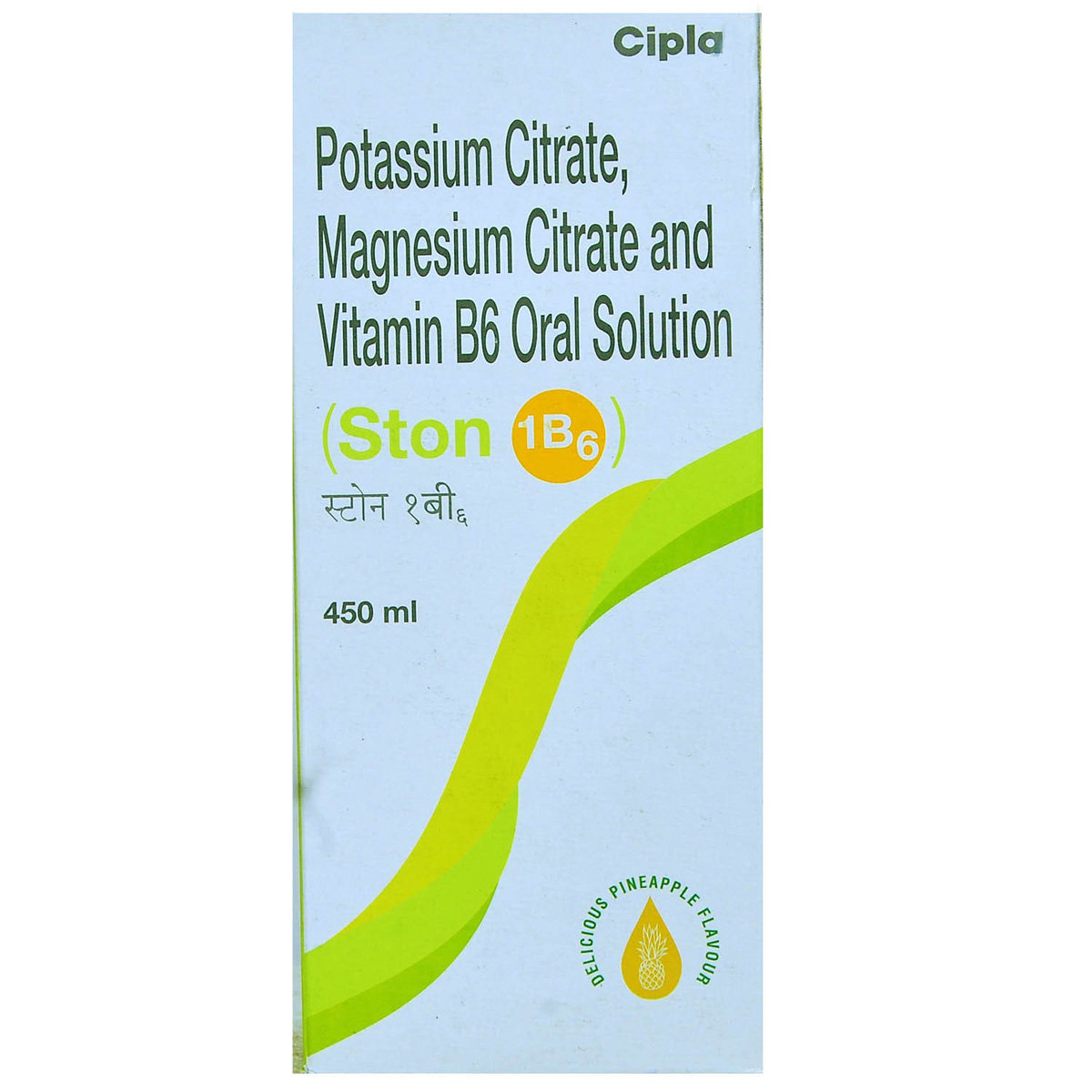
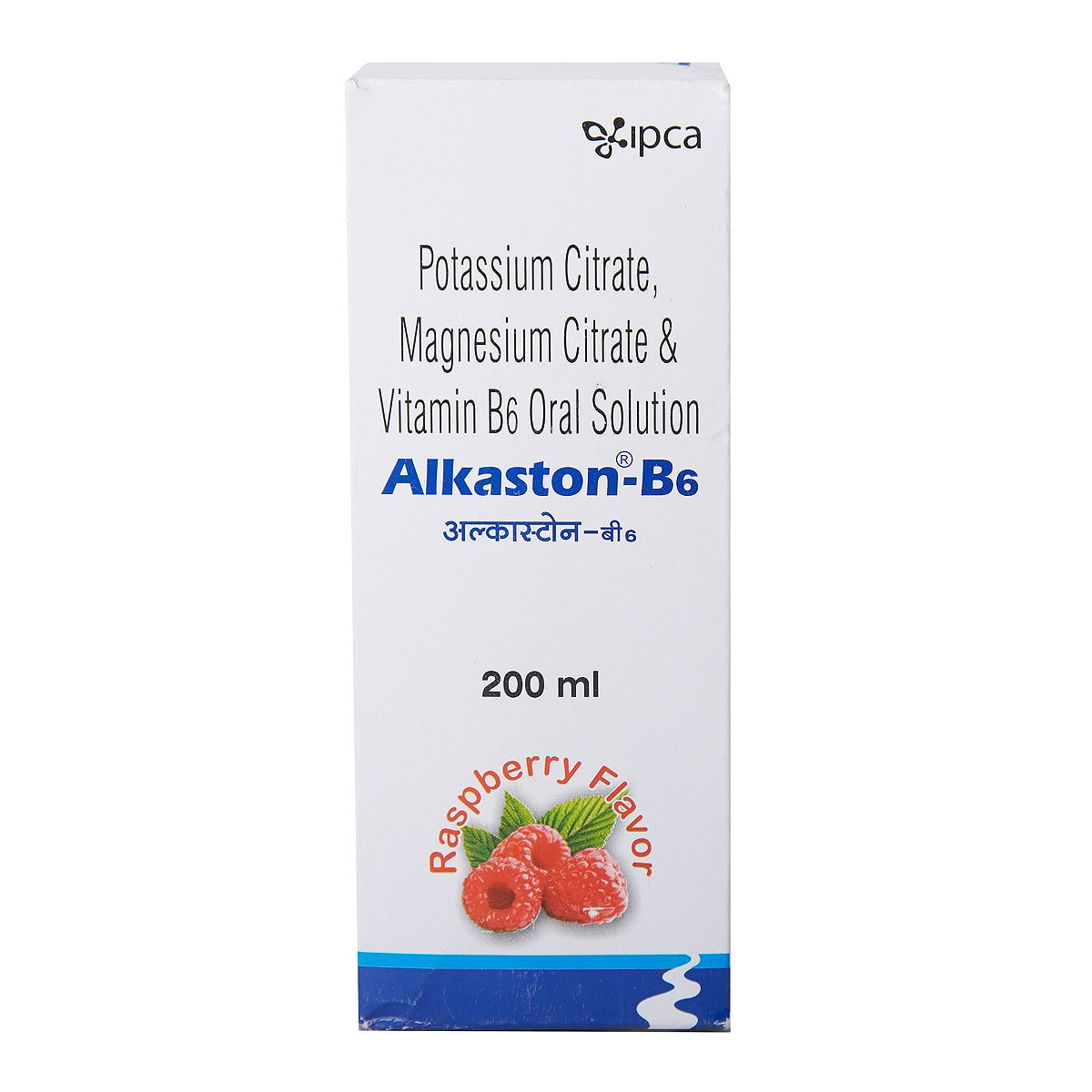


_0.jpg?tr=q-85)
